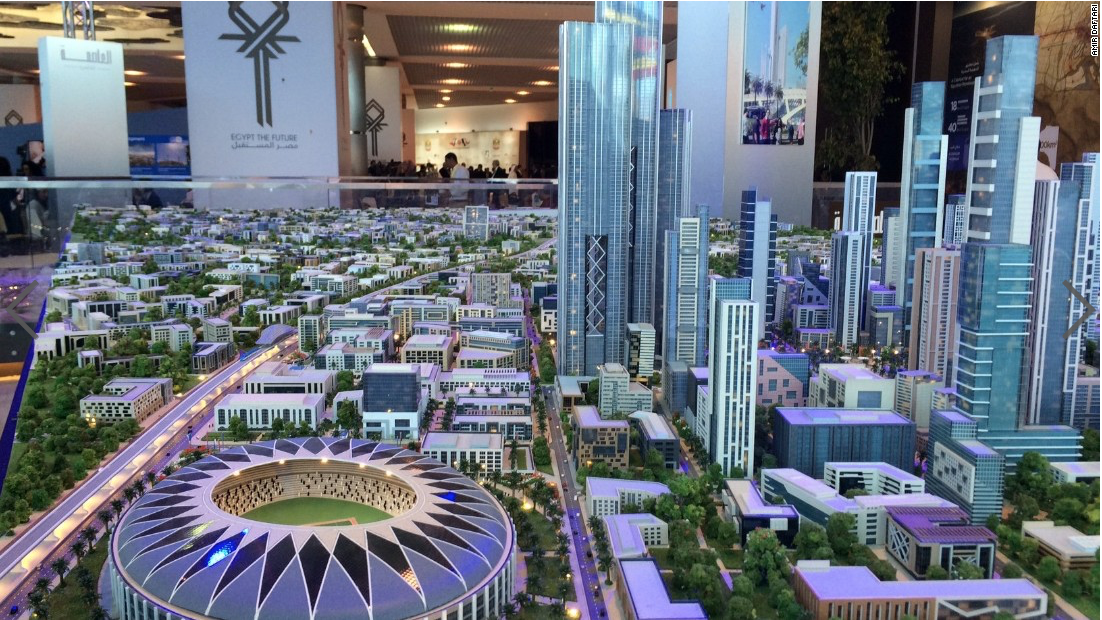Egypt’s new capital city moved a step closer to reality with the announcement that Chinese developers will largely fund the mega project.
The China Fortune Land Development Company (CFLD) agreed to provide $20 billion for the currently unnamed city, after a meeting between heads of the firm and Egyptian President Abdel Fattah El Sisi.
This follows a previous commitment of $15 billion from another Chinese state-owned company, bringing the project close to its $45 billion budget requirements for phase I.
(CNN, October 10, 2016)
Egypt is just one of many longstanding US allies that are not only defying its calls for democratic freedoms, but looking to China as a more suitable superpower patron.
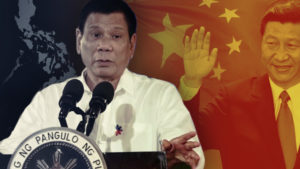 Here, for example, is how Agence France-Presse reported just last Monday on the Philippines breaking ranks:
Here, for example, is how Agence France-Presse reported just last Monday on the Philippines breaking ranks:
Philippine President Rodrigo Duterte is willing to hold military exercises with China but not longtime ally the United States, Chinese media quoted him Monday as saying on the eve of a state visit.
Duterte heads to Beijing on Tuesday for a four-day trip that appears set to cement his dramatic foreign policy tilt away from United States, which he has railed against for criticising his deadly war on crime…
‘China never criticizes …,’ Duterte said, according to Xinhua.
In fact, Egypt has become so bold in this respect that I marveled at its defiance in “Egypt Lecturing US on Democratic Principles…?” June 25, 2014. But a little background might help to put these shifting alliances into perspective.
The Cold War was defined by the United States and Soviet Union forging military alliances around the world to widen their respective “spheres of influence.”
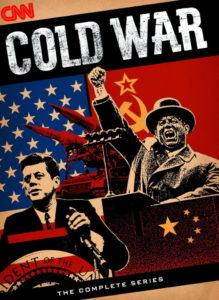 This invariably had both countries reinforcing alliances by investing more in the military than the economy of countries in their respective spheres. Moreover, neither the United States nor the Soviet Union could have cared less about leaders of poor countries skimming billions from military aid for personal use, so long as they pledged allegiance to their respective superpower patrons.
This invariably had both countries reinforcing alliances by investing more in the military than the economy of countries in their respective spheres. Moreover, neither the United States nor the Soviet Union could have cared less about leaders of poor countries skimming billions from military aid for personal use, so long as they pledged allegiance to their respective superpower patrons.
Then the Soviet Union disintegrated (in 1991). And the United States began touting a “peace dividend,” which would enable it to invest more in the economy than the military of countries in its widening sphere of influence. Indeed, it proceeded to controversially (and ill-advisedly) co-opt many countries that were in the old Soviet sphere.
More to the point, in addition to cutting military spending, it began placing conditions on foreign aid, hoping to promote democratic freedoms, good governance, and free enterprise. The problem, however, is that leaders of developing countries resented and resisted those conditions. Consequently, this peace dividend did little to combat corruption or alleviate poverty.
It is particularly noteworthy that, since the end of the Cold War, the United States has donated billions to combat infectious diseases throughout Africa and the Caribbean. Yet, although grateful, many throughout these regions see this aid as mostly furthering the enlightened national interest of the United States; namely fighting the disease over there before it begins spreading over here.
Enter Vladimir Putin.
After a brief period of entente cordiale with the United States (2000-2004), he launched a neo-Stalinist campaign to turn Russia into a police state and wield Soviet-style influence abroad.
Commentators routinely cite his silencing of the press and annexation of Crimea in this respect. But he has also jailed dissident oligarchs and annexed whole regions of neighboring Georgia. Hell, he has even threatened to reopen the Soviet military base in Cuba, stirring up the most apocalyptic fears of the Cold War.
I coined the term Putinization to describe this campaign, and I’ve chronicled it in many commentaries, including “President Putin Reforming Russia in His Own Image,” March 25, 2005, “Cold War Redux: Friendship Over Between Russia and the United States,” May 5, 2006, “Russia Consolidates Control Over Georgian Territories…Despite Ceasefire,” August 14, 2008, “Hello 1937 – Putin Turning Russia Back to Stalin Days,” June 13, 2012, and “Russia Gobbling Up Ukraine: First Crimea, Now Donetsk…Next Odessa?” May 13, 2014.
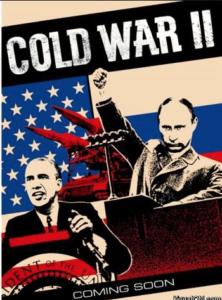 No surprise then that we are now on a march of folly into a new Cold War. Nothing betrays this quite like the United States and Russia fighting a war by proxy for superpower influence in Syria. And, just as it was in the old days, both countries seem determined to wield military influence at all costs – Syria’s economic development, even the lives of its people, be damned.
No surprise then that we are now on a march of folly into a new Cold War. Nothing betrays this quite like the United States and Russia fighting a war by proxy for superpower influence in Syria. And, just as it was in the old days, both countries seem determined to wield military influence at all costs – Syria’s economic development, even the lives of its people, be damned.
Not to mention the cyber warfare both countries are waging – against each other and by proxy (e.g., the United States using Ukraine to troll Russia, and Russia using WikiLeaks to troll the United States). I bemoaned this flaring up of Cold War II in such additional commentaries as “Russia and the United States in Chess Game for Syria,” September 13, 2013, “Bombing ISIS Smacks of Masturbatory Violence,” November 18, 2015, and “Alas, Syrian Peace Plan No. 44 Will Fare No Better,” September 10, 2016.
Enter China.
Here is how I began commenting on China’s rise as a superpower in “China Buying Political Dominion Over the Caribbean (Latin America and Africa),” February 22, 2005.
___________________
Vice President Zeng Qinghong is expected to consolidate China’s geopolitical strategy of co-opting the economies of the Caribbean. He reveled in the Santa Claus-like reception he got at every port of call during his tour of the region…
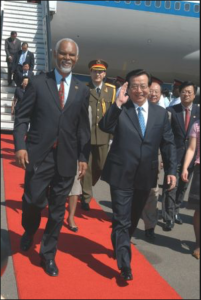 However, allusions to Christopher Columbus might be more fitting. Because China’s search for new markets is really a quest for political dominion. And, with massive direct investments and Chinese tourists boosting visits to unprecedented levels, China will soon become indispensable to countries throughout the Caribbean, Latin America, and Africa. Naturally, this would enable China to exercise unprecedented and unchallengeable political influence…
However, allusions to Christopher Columbus might be more fitting. Because China’s search for new markets is really a quest for political dominion. And, with massive direct investments and Chinese tourists boosting visits to unprecedented levels, China will soon become indispensable to countries throughout the Caribbean, Latin America, and Africa. Naturally, this would enable China to exercise unprecedented and unchallengeable political influence…
What happens if China decides that converting the container ports, factories, and chemical plants it has funded throughout the Caribbean into dual military and commercial use is in its geostrategic interest? Would these governments comply? Would they have any real choice? And when they do comply, would the U.S. then blockade the island at issue, namely the way it blockaded Cuba during the missile crisis?
Now consider China making similar strategic moves in Latin America where its purportedly benign Yuan diplomacy dwarfs its Caribbean operations. This new Cold War could then turn very hot indeed.
___________________
Sure enough, China has been on a quest over the past decade to amass superpower influence around the world to rivals that of the United States and Russia.
But, unlike them, China has been keen to reinforce alliances by investing far more in the economy than the military of countries it is trying to wrest into its sphere. No doubt it helps that China places none of the conditions on its aid that caused leaders of so many developing countries to resent and resist U.S. aid.
This is not to say that Chinese aid is completely without conditions. After all, it invariably comes with legions of Chinese workers (spies?) attached. And China has used “yuan diplomacy” to induce nearly every country in the world to sever diplomatic ties with its fraternal enemy, Taiwan, which it maintains is just a “renegade province.” It’s just that those conditions never interfere with the way leaders govern the countries receiving its aid.
It is hardly surprising, therefore, that many leaders of developing countries have been and are keen to emulate the Chinese/Russian paradigm of an authoritarian government lording over a market-oriented economy. And who can blame them? Especially given that virtually every Republican in the United States hails Vladimir Putin as a better leader than Barack Obama — even if they do so only for partisan, if not racist, reasons.
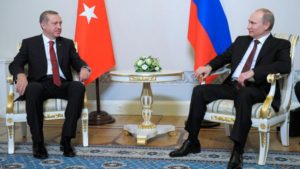 In any event, here is how Newsweek reported last July 28 on Turkish President Tayyip Erdogan emulating that paradigm:
In any event, here is how Newsweek reported last July 28 on Turkish President Tayyip Erdogan emulating that paradigm:
Putin and Erdogan have a lot in common: Both have pioneered a kind of populist authoritarianism. And both share a deep suspicion of the United States…
Since the coup attempt [which I commented on in “Turkey: Bungled Coup Fails. Grave Purge Begins,” July 16, 2016], Erdogan has become more like Putin as he cracks down on opponents at home — not only on rebel soldiers and generals but on journalists, academics, teachers and judges too.
I have marveled at China’s rise in this context in such additional commentaries as “China Putting Squeeze on The Bahamas. Your Country Could Be Next,” October 22, 2010, “Countries Queuing Up to Become Indebted to China…,” September 15, 2011, “China Prevailing Upon South Africa to Ban the Dalai Lama…,” September 30, 2011, “China’s Deficit? No Moral Authority to Lead,” November 16, 2011, “China Invading US Sphere of Influence in the Caribbean,” April 11, 2012, and “‘All the World Is at War’ Hardly Means World War III,” November 30, 2015, which includes this foreboding observation.
__________________
You’d be forgiven for wondering about China’s conspicuous absence from this fight [in Syria]. The reason is that China has so cultivated its self-serving and self-preserving policy of non-interference, it would not lift a finger to stop ISIS from conquering every country in the Middle East. This, so long as ISIS did not impinge on its sovereignty and was willing to supply its demand for oil.
In other words, if China (instead of the United States) were the only world power capable of stopping the Nazis during WWII, Hitler would have realized his dream of turning all of Europe into a fascist paradise (e.g., free of Jews, blacks, and gays). This informs my abiding admonition about weak/poor countries, especially in Africa and the Caribbean, heralding China as a more worthy superpower patron than the United States.
China is the world’s most economically successful authoritarian government. It will continue favouring like-minded authoritarian regimes.
(Reuters, November 29, 2015)
__________________
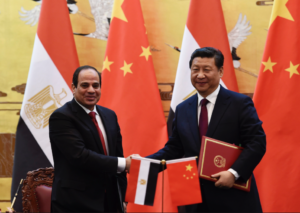 I cannot overstate that there’s nothing diplomatic about China adhering so zealously to its policy of non-interference in the internal affairs of other countries. The simple fact is that this policy provides the political cover it needs to rebuff calls by countries like the United States to allow democratic freedoms and respect human rights.
I cannot overstate that there’s nothing diplomatic about China adhering so zealously to its policy of non-interference in the internal affairs of other countries. The simple fact is that this policy provides the political cover it needs to rebuff calls by countries like the United States to allow democratic freedoms and respect human rights.
This brings me back to the way China is now favoring Egypt’s authoritarian regime. Because it really crystallizes the difference between the way China amasses its superpower influence and the way Russia and the United States did/do. Specifically, while they are busy fighting for control of Syria – complete with Russia vowing to build a new military base there to reinforce its influence, China is busy buying political influence by building a new capital city in Egypt.
It should not take a genius to figure out that the Egyptian people will be eternally grateful to China for spending tens of billions over the next 5 years to build their new capital city. Whereas they probably harbor little more than resentment towards the United States for spending tens of billions over the past 50 years to build their great military.
Again, China has made similar (infrastructural) investments in the economies of many other countries, where people are showing similar gratitude. What’s more, given the failure of the Arab Spring to bear the liberating fruits of democracy, people across the developing world can be forgiven for storing more hope these days in Chinese/Russian-style authoritarianism than American-style democracy. Which clearly bodes ill for the harvesting of democratic freedoms around the world….
Related commentaries:
Turkey coup…; Egypt lecturing US…
Putin reforming Russia…; Cold war redux…
Russia consolidates…; Hello 1937…
Russia gobbling up Ukraine…
Russia and US chess game for Syria…
Putin’s Bush-lite mission in Syria…
Syrian peace plan…; china buying dominion…
China putting squeeze on The Bahamas…
Countries queuing up…; China bans Dalai Lama…
China’s deficit…; Hardly WW III…; Arab Spring…
